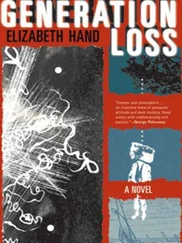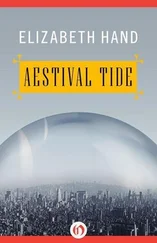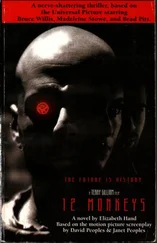Trip nodded. He shoved the wallet into his pocket, then looked at the box. “What’s this?”
“The sextant.” Martin turned away. “I—I’d like you to have it.”
Trip shook his head. “But don’t you need it? Can’t you use it, to steer by?”
“I won’t need it, no. You go ahead, keep it—”
He wanted to say, To remember me by, instead only smiled.
“Okay.” Trip stared at him. His mouth twisted as though frowning, and for an awful instant Martin thought he was undone: Trip had seen through him, the Fundamentalist monster would stand finally revealed on deck beside the queer activist. Instead, to his shock, he realized that Trip was fighting tears.
“Okay,” he repeated, thickly. He glanced away into the darkness of the cabin, then down at the sextant. Something seemed to catch his eye. Without looking up he pulled something from his hand, then held it out to the older man.
“Here,” he said. “You can, um, have this—”
It was his ring.
“Oh.” Martin gave a stunned gasp. He shook his head. “Trip! I—Christ, I couldn’t. I mean, that’s your—isn’t it from her? Your—well, whoever?”
“Take it,” Trip urged. He held the sextant to his breast as he nudged Martin with his other hand. “Please,” he added softly. “I want you to—”
“But—”
“I don’t know where it came from. I mean, she did have a ring like this, and so did her mother—but she didn’t give it to me. I really don’t remember how I got it.”
“Well.” Martin took it. The metal band was thin and weighed almost nothing. He pinched it between two fingers, then slid it onto the pointer finger of his left hand. “It fits.” He fought to keep his tone light. “Thank you, Trip. Really.”
“Okay.” Trip looked at him, then at the sextant, and grinned. “Wow. We really made it, huh?”
Martin smiled. “We really made it.”
The boy nodded, then opened his knapsack and stuffed the box inside. “Okay,” he said, clambering up on deck with Martin behind him. “I guess I’m off.”
He stood in front of the older man, suddenly looking awkward and very young. Martin smiled again, thought What the hell, and leaned forward to hug him. He could feel Trip’s shoulders tighten. After a moment he backed away.
“All right. You better go, before it gets too late—”
Martin sank into the cockpit and clasped the tiller, watching as Trip poised himself on the traveler and measured the jump he’d have to make to the stony mound below. Without a backward glance he leapt, stumbling but catching himself before he could fall.
“All right!” Trip shouted excitedly. He turned and shaded his eyes, looked up at the Wendameen and waved. “Thanks, Martin! Thanks a million! Good luck—”
Martin nodded. His face hurt where tears scored his cheeks, but it no longer mattered if Trip noticed. “Good luck, Trip. Good luck—”
He revved the engine, then angled the tiller so that the boat slid from the quay, her hull grating against bricks and rubbish. I won’t look back I won’t look back he thought; and for several minutes cut through the viscous waters, his eyes fixed on a horizon that boiled with lurid clouds and the shifting forms of distant boats.
Finally he could stand it no longer. He was far enough out that a fresh wind began to play across the deck, tugging at furled canvas and cooling Martin’s scorched face. If he squinted into the harsh light he could just make out the bright triangles of other sailboats braving the reach. He could hoist sail now, if he wanted to, make it past Staten Island and Raritan Bay and into open water. He took a deep breath and turned to gaze behind him.
In the distance the island reared, its shore a shabby tartan of decayed buildings, collapsed roads, twisted girders, glass and steel towers erupting from the ruins like spaceships from the desert. His eyes sought desperately to find the mound where he had left Trip, but it all looked the same now.
He had waited too long. Then as in a dream Martin saw a bright jot moving against black ruins, disjoined from the surrounding landscape as a gull in flight. Martin cried out, madly waving—
“Trip ! Trip !”
—and the brightness halted before the immense backdrop of the ruined city, and almost Martin could imagine a raised hand meeting his farewell.
“Martin! Martin, good-bye —”
Tears burned his eyes. He dragged his sleeve across them and when he looked out again the bright spark was gone. He glanced at his hands, twin gold slivers winking from each one. Beneath him the engine thrummed, the boat stirred as swells lifted her and the breeze plucked at the sails. She wanted to be gone; she wanted to be underway.
“It’s time then,” said Martin. “It’s time.”
He killed the engine and pulled himself on deck. Freed the sails and trimmed them back, ducking as wind filled them and the boom sliced through the air a handspan away. Breathless, he eased into the cockpit and grasped the tiller. Ahead of him the sky coiled and uncoiled. Boats skimmed past, and seabirds. A shadow moved across the planks in front of him and Martin smiled and nodded without a word, recognizing the shape that streamed from the darkness, the long span of arms reaching for him and the breath that stirred the hairs on his neck. Felt his heart tear like a fist pounding its way out, as the tiller slipped from Martin’s hand and he turned at last, no longer afraid, falling into the embrace John and darkness and desire all stitched at last into one, all there, all healed; fell into it and he was light and joy, light and the end of waiting; he was nothing but nothing but light.
Catastrophe Theory
The power stayed on for almost three weeks, the longest stretch Jack could remember since the glimmering began. At first they all went charily from day to day, meeting at breakfast to exclaim over Mrs. Iverson’s coffee cake or date muffins. There were plenty of baking supplies, since she so rarely had the chance to bake, and plenty of time to spend eating, since no one had anything else to do. After breakfast they moved into the living room—everyone except Mrs. Iverson—to sit with all the lights on, heat wafting up from the floor registers and warm smells from the kitchen, and watch morning television. Keeley dozed, occasionally woke to shake her head in dismay at goings-on in Calgary or Bangkok. On the floor Marz lay like a beached zeppelin, her lunar belly occupying a formidable portion of Jack’s view of the TV screen. There were no more outbursts at music videos. Jack had not been able to get any kind of explanation out of the girl. He finally chalked it up to some bizarre Last Generation analogue of Beatlemania, and tried to convince himself that with the power restored, maybe the world had toppled back onto its axis, after all. Some evenings he found her standing in the second-floor stairwell, her swollen belly pressed against the sill, hands pressed against the glass as she stared out at the broken house next door. Chiaroscuro of flame and smoke and thrashing bodies, smash of bottles, raucous laughter; and the blond girl gazing hungrily as though she beheld a vision of Paradise.
I saved you from that! Jack wanted to shout when he saw her; but when she heard his tread she would turn and wobble off. Oh God, poor thing, he thought, at the notion of bringing a child into this world. But she didn’t see it so; her belly bloomed even as her rail-thin legs grew hard and thick with edema and her eyes took on a distant dreaming look, as though already she were asleep after the trauma of labor; as though dreaming she saw beyond this darkness.
The autumn passed. One day a postman arrived, with bills and a letter from Jack’s brother Dennis, postmarked eight months earlier. Lights worked, hot water came from the taps (never enough but that wasn’t new), Tristan und Isolde thundered from his old Bose speakers. Mrs. Iverson would do the dishes, then teeter downstairs to see to the laundry, then return to start on lunch and dinner, or to bring Keeley tea and Marz some more muffins—Jack didn’t eat much these days. All of them frantically tapping into the capricious current flowing through the house, as though that were the way to stave off chaos.
Читать дальше












